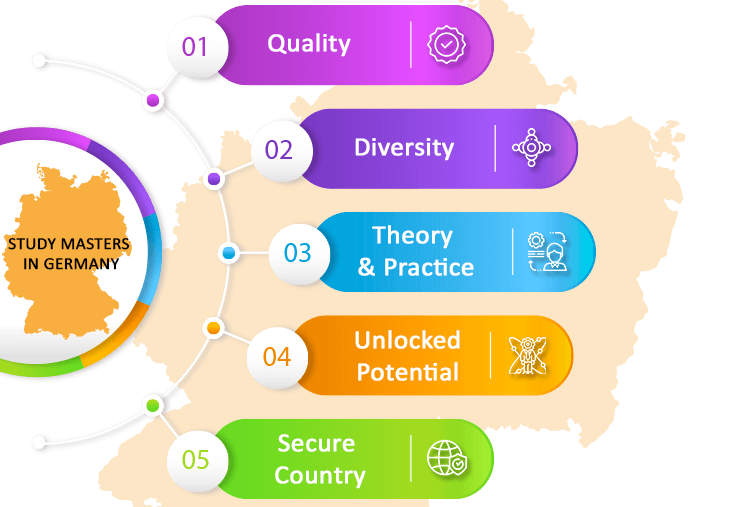- Call us on +91 85859 54773
- email us at counsellors@eugateway.in




It’s easy to understand why Europe is one of the most popular postgraduate study locations for international students from all around the world. Studying in Europe will provide you with the opportunity to benefit from the decades of academic renown and experience acquired at the world’s oldest universities.
Your journey will allow you to study other languages, get job experience overseas, and demonstrate to prospective employers that you have the skills and experience essential to thrive in a globalized society. Study in Germany to enjoy the benefits of decades of academic renown and expertise.
STUDY MASTERS IN GERMANY
Germany boasts more top-ranked universities than any other country other than the United Kingdom and the United States. Given its robust economy, historic higher education system, and a huge number of English-taught courses in the country, it’s no surprise that Germany is one of Europe’s top locations for postgraduate studies. Even better, the bulk of German Master’s degrees are free of charge for Masters in Germany.
Only a handful of countries can claim to be the “land of ideas,” and even fewer can claim to be associated with some of history’s most illustrious thinkers. Germany has long been recognized as an intellectual powerhouse, from Immanuel Kant’s philosophy to Albert Einstein and Werner Heisenberg’s theoretical physics.
Here are some of the reasons why you should consider studying in Germany for your Master’s degree in 2021-22:
1. Quality is the first thing that comes to mind.
German universities are among the best in the world when it comes to teaching and researching. You’ll graduate with a degree that’s recognized across the world, giving you a leg up on the global job market.
2. Diversity
German universities provide a wide variety of courses, allowing you to specialize in a particular field of study. You can study masters in Germany and choose from a wide range of international and interdisciplinary degree programmes. Discover Germany’s beauty and variety! There are a million ways to learn about your host nation when you take a break from your academics.
3. Many study programmes integrate theory and practice in their curriculum.
As for academic programmes, German universities are world-class, while German universities of applied sciences provide a wide choice of appealing, practice-oriented programmes. Many study programmes integrate theory and practice in some way. Several colleges work with businesses. This will make it easier for you to begin your profession.

4. Unlocked Potential
You can make the most of yourself in Germany and study Masters in Germany for free. This is a place where you may improve your academic talents and personal skills in a way that allows you to maximize your potential. Determinant, drive, and dedication can open numerous opportunities for you throughout and beyond your studies if you’re determined to succeed.
5. Secure Country
Germany is a safe country in comparison to others. You may roam around freely here, whether in town or the countryside, during the day or at night. Germany provides economic and political stability, making it a great location for you to study.
Why You Should Study Masters in GERMANY
Higher education institutes in Germany have a stellar reputation. Teaching and research are critical stimulants for creativity and growth. Germany universities for Masters, integrate research and education and have been the site of groundbreaking inventions such as the printing press, the computer, and mp3, all of which have become inseparable aspects of our contemporary life.
Thousands of international students and intellectuals opt to study in Germany each year and some of them are eligible to study Masters in Germany for free. There are several compelling reasons for this. These include, among other things, International Programs taught in English, outstanding educational quality, no tuition costs, potential job prospects, and, most importantly, a dynamic social and cultural environment.
Postgraduate education in Germany adheres to a standard European structure created as part of the Bologna Process.
This implies that German Masters degrees are ‘second cycle’ qualifications: they generally come after a Bachelor’s degree (first cycle) and can prepare a student for a PhD. (third cycle).
Most Master’s degrees in Germany are taught courses (postgraduate research is undertaken at the PhD level). You will finish an individual dissertation or project following a sequence of academic modules or other course components.

Eligibility Criteria To Study Masters in GERMANY
A good Bachelor’s degree is the main qualification for entrance to a Masters programme in Germany. This doesn’t have to be a German degree, but it must be recognized by the German university you’re applying to be accepted.
Some of these may require:
- Specifics about your secondary schooling
- An interview
- Competitive (or specialized)
Some highly competitive programmes may want to see more information about an overseas student’s educational background.
German universities may wish to speak with you about your application and experience. For international students, video interviews can occasionally be arranged.
programmes may require you to take an extra entry exam or standardized postgraduate admissions test. This may be used to check your existing training in professional fields. A score from a recognized test, such as the GMAT or GRE, is also likely required by business schools and MBA programmes.
Course duration and credit value to study Masters In Germany
German Master’s programmes typically last two years (or two to four semesters of study).
Your degree will be worth 120 ECTS credits in total. Ninety will be obtained through courses, homework, and examinations. The remaining 30 points will be given to your dissertation.
What factors should I consider while selecting a university in Germany?
In Germany, there are different types of higher education institutes. The vast majority of these fall into one of two categories:
Universities are focused on research and provide a diverse range of courses. These are capable of conferring doctorates.
University of Applied Sciences (Fachhochschulen, abbreviated FH) are more practice-oriented and provide courses mostly in engineering, business administration, social sciences, and design. These have strong linkages to industry and provide opportunities for collaborative supervision of a master’s thesis by a professor and a firm. Although Fachhochschulen does not issue doctorates, as a master’s degree holder, one is in principle eligible to apply for a PhD at a university.
Which of the two types of institutions you pick should be determined by your interests and inclinations!

Research Universities
Universities that do original academic work (i.e. research)
on various topics are known as research universities. They provide a variety of Masters and
PhD degrees.

Technical Universities
Traditionally, technical universities (Technische Universitäten) specialise in science, technology, and engineering research. Many now provide qualifications in a variety of subjects.

Universities of Applied Science
Concentrate on practical disciplines like engineering, business, and social science. They frequently collaborate with commercial or professional organizations.

Art, Film and Music
Art, film, and music colleges provide specialized practical education in creative areas. Typically, candidates must exhibit adequate creative abilities and experience.
What types of Master’s programmes are available in Germany?
There is a diverse selection of study programmes available.
German as a language of teaching
International Programs use English as the single or major medium of teaching.
Germany provides a comprehensive rating that takes into account a variety of characteristics essential to students. For example, student and faculty evaluations of teaching quality, university atmosphere, library and other equipment, student numbers, average study length, number of graduates, third-party support, etc.

Eligibility to apply for masters in Germany
Every university in Germany is autonomous. This implies that each university/study programme has its unique set of admissions standards. Please consult the university’s website, especially the programme you are interested in, to determine the exact entrance criteria. Most universities would consider you suitable for masters providing you meet other criteria.
However, some generalisation is feasible, and as a four-year Bachelor degree holder from Bangladesh, Bhutan, India, Nepal, or Sri Lanka, your degree is regarded on par with a German bachelor degree. If you hold a three-year Bachelor’s degree, please contact the course organiser before applying.
Depending on the topic you want to study, certain institutions may require TOEFL/IELTS/GRE/GMAT results. Such as in economics or law school, where the GMAT is required for admission. You’ll need excellent German language abilities if you wish to enrol in a German-medium programme.
- Tuition fee
- Funding
- Visa Requirements
A state-funded university in Germany does not collect tuition since it receives government funding. As a result, almost every student in Germany receives a scholarship! Courses given by private institutions and some specialized courses might be expensive.
Student visa holders can work 120 full-time or 240 half-time days per year. This will help you earn a little more cash!
After earning your degree in Germany, you can select from a variety of choices, including: You can stay in the nation for up to 18 months to seek work related to your study. When you find work, you can change your study permit into a work permit. Germany has long had a strong industry-academia connection. The industry also funds a significant amount of scientific research. During your education, you may conduct internships with German firms, which may open up new doors for your professional future.
In addition, the German government gives significant financial assistance to help students meet their living expenses, with need-based and merit-based assistance available.
Your nationality determines immigration and residency requirements in Germany.
There is no visa needed to pursue a Master’s in Germany if you are from the EU, EEA or Switzerland. However, a residency permit is required.
Student visas and residency permits are usually required for international students.

